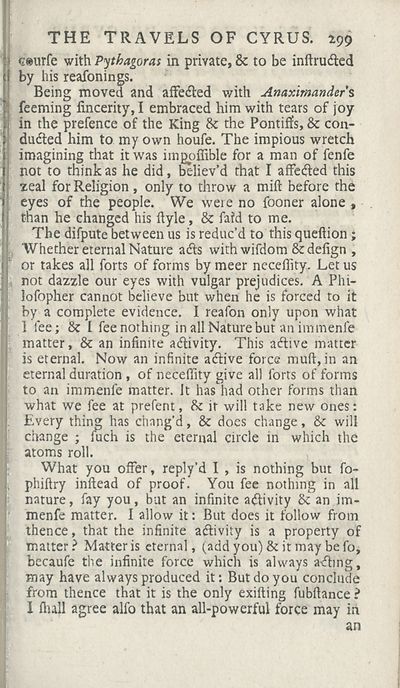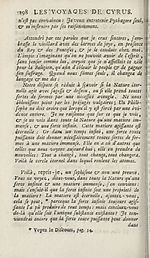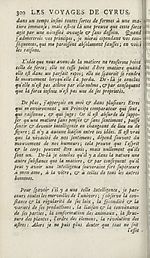Download files
Complete book:
Individual page:
Thumbnail gallery: Grid view | List view

THE TRAVELS OF CYRUS. 199
<z»urfe with Pythagoras in private, & to be inftru&ed
by his reafonings.
Being moved and affedted with Anaximander %
feeming fincerity,! embraced him with tears of joy
in the prefence of the King & the Pontiffs, & con¬
ducted him to my own houfe. The impious wretch
imagining that it was imgpffible for a man of fenfe
not to think as he did, believ’d that I affedted this
zeal for Religion, only to throw a mift before the
eyes of the people. We weie no fooner alone ,
than he changed his ftyle, & faid to me.
The difpute between us is reduc’d to this queftion;
Whether eternal Nature adts with wifdom & defign ,
or takes all forts of forms by meer neceffity. Let us
not dazzle our eyes with vulgar prejudices. A Pht-
lofopher cannot believe but when he is forced to it
by a complete evidence. I reafon only upon what
1 fee; & I fee nothing in all Nature but an immenfe
matter, & an infinite adtivity. This adtive matter
is eternal. Now an infinite adtive force muft, in an
eternal duration, of necefiity give all forts of forms
to an immenfe matter. It has'had other forms than
what we fee at prefent, ft: it will take new ones:
Every thing has chang’d, 8c does change, 8c will
change ; fuch is the eternal circle in which the
atoms roll.
What you offer, reply’d I , is nothing but fo-
phiftry inftead of proof. You fee nothing in all
nature, fay you, but an infinite adtivity 8c an im¬
menfe matter. I allow it: But does it follow from
thence, that the infinite adlivity is a property of
matter ? Matter is eternal, (add you) 8c it may be fo,
becaufe the infinite force which is always a-dbng,
may have always produced it: But do you conclude
from thence that it is the only exifting fubftance ?
I Hull agree alfo that an all-powerful force may in
<z»urfe with Pythagoras in private, & to be inftru&ed
by his reafonings.
Being moved and affedted with Anaximander %
feeming fincerity,! embraced him with tears of joy
in the prefence of the King & the Pontiffs, & con¬
ducted him to my own houfe. The impious wretch
imagining that it was imgpffible for a man of fenfe
not to think as he did, believ’d that I affedted this
zeal for Religion, only to throw a mift before the
eyes of the people. We weie no fooner alone ,
than he changed his ftyle, & faid to me.
The difpute between us is reduc’d to this queftion;
Whether eternal Nature adts with wifdom & defign ,
or takes all forts of forms by meer neceffity. Let us
not dazzle our eyes with vulgar prejudices. A Pht-
lofopher cannot believe but when he is forced to it
by a complete evidence. I reafon only upon what
1 fee; & I fee nothing in all Nature but an immenfe
matter, & an infinite adtivity. This adtive matter
is eternal. Now an infinite adtive force muft, in an
eternal duration, of necefiity give all forts of forms
to an immenfe matter. It has'had other forms than
what we fee at prefent, ft: it will take new ones:
Every thing has chang’d, 8c does change, 8c will
change ; fuch is the eternal circle in which the
atoms roll.
What you offer, reply’d I , is nothing but fo-
phiftry inftead of proof. You fee nothing in all
nature, fay you, but an infinite adtivity 8c an im¬
menfe matter. I allow it: But does it follow from
thence, that the infinite adlivity is a property of
matter ? Matter is eternal, (add you) 8c it may be fo,
becaufe the infinite force which is always a-dbng,
may have always produced it: But do you conclude
from thence that it is the only exifting fubftance ?
I Hull agree alfo that an all-powerful force may in
Set display mode to:
![]() Universal Viewer |
Universal Viewer | ![]() Mirador |
Large image | Transcription
Mirador |
Large image | Transcription
| Antiquarian books of Scotland > Adventure and adventurers > New Cyropaedia, or The travels of Cyrus > (325) |
|---|
| Permanent URL | https://digital.nls.uk/120273466 |
|---|
| Description | Thousands of printed books from the Antiquarian Books of Scotland collection which dates from 1641 to the 1980s. The collection consists of 14,800 books which were published in Scotland or have a Scottish connection, e.g. through the author, printer or owner. Subjects covered include sport, education, diseases, adventure, occupations, Jacobites, politics and religion. Among the 29 languages represented are English, Gaelic, Italian, French, Russian and Swedish. |
|---|

